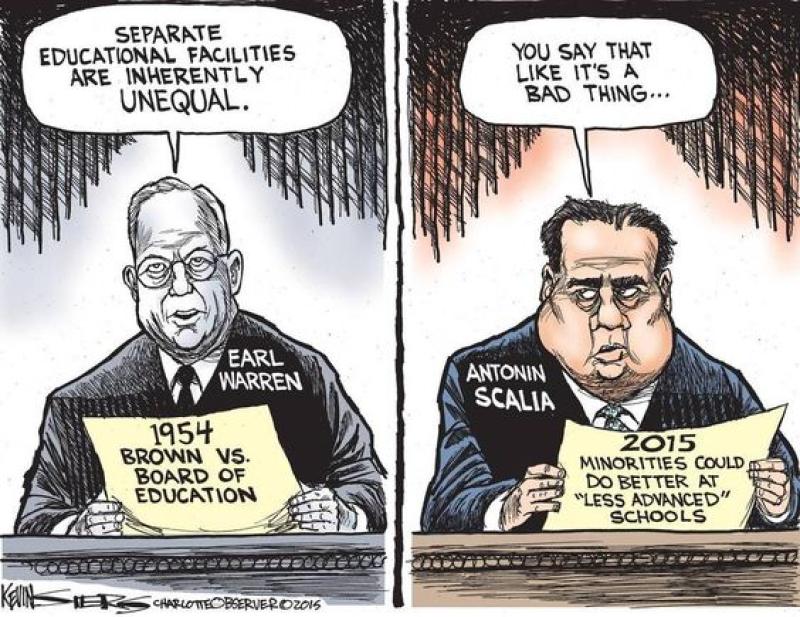'Originalism' denies — and despises — the 'new birth of freedom'
By: Fred Clark - slacktivist





I tweeted this yesterday afternoon , after Supreme Court nominee Amy Coney Barrett described herself and her judicial "philosophy" as "originalism."
Ever notice that "originalists" don't tend to quote, say, Thaddeus Stevens or John Bingham?
Kind of a tell.
— SlacktivistFred's 1611 project (@SlacktivistFred) October 13, 2020
It was uncomfortable to discover later that chastened Bush-advisor David Frum had beaten me to the punchline of this joke when he'd said something similar earlier in the day:
Nobody seems ever much to worry about the original intent of the authors of the post Civil War constitutional amendments. — David Frum (@davidfrum) October 13, 2020
Neither one of us was really joking, of course. Despite the wry tone, the point is deadly serious: Any talk of the "original intent" or "original meaning" of the Constitution that doesn't acknowledge the revolutionary transformation of the Reformation Amendments is ignorant, misleading, and false.
And yet none of the judicial champions of "originalism" ever seems to concern themselves with anything that happened after the 18th century. Their concept of "origins" wears a powdered wig, never a stovepipe hat and a beard. The radical change of the second founding, what Lincoln called our "new birth of freedom," isn't something so-called originalists understand or account for. The ways in which the Constitution and the nation were so dramatically changed after the Civil War are so wholly disregarded by these originalists that it's surprising they don't treat "the United States" as a plural noun.
This isn't the only problem with the faux-naive pretense of "originalism" — a infinitely elastic and pliable construct that strip-mines the past for whatever it finds convenient or useful. But it is a huge, ridiculously foolish characteristic of the scheme. It means that an originalist is basically someone who tells you a butterfly is not a butterfly because caterpillars don't have wings.
Metamorphosis isn't too grand an analogy for the pervasive changes wrought by the second founding and the revolution encoded in the Reconstruction Amendments. These were not tacked on as additions to the existing Constitution as it was written or "intended" in 1789. They transformed the whole of the thing, enriching and deepening and expanding the meaning of the rest of the document. There's a reason we call the Radical Republicans of that era "radical." They reached down to the roots of the Constitution and turned the whole of it into something new.
And yet, today, these Founding Fathers are as invisible to the judicial activists wearing the mask of "originalism" as they are invisible to the children force-fed David Barton's Christian nationalist propaganda instead of real history. This oversight is so monumental that it's difficult to imagine it could be accidental. And we have good reason to conclude that it is not.
The problem with originalism isn't that it merely ignores the Reconstruction Amendments, but that it deliberately, actively, and willfully avoids them. Or, in other words, "originalists" aren't ignorantly acting as though the transformation of the Constitution after the Civil War never happened, they are deliberately attempting to create an America in which that transformation never happened. The Reconstruction Amendments are not a blindspot for originalists, they're a bullseye — an indication of what it is they're targeting and seeking to destroy.
Nowhere is this clearer than in any discussion of the Constitution and the right to vote. Originalists will pretend that right is not explicitly protected in the Constitution and that the Constitution was never intended to create or to guarantee or to protect any such right.
This pretense can't survive any encounter with the 13th, 14th, and 15th Amendments. And it is utterly demolished by even the briefest consideration of the "original intent" of the founders who drafted and debated and enacted those amendments. Those debates are as well-documented as any of the 18th-century discussions that originalists love to cite when seeking evidence of "original intent" from that earlier period that might support whatever agenda they're seeking to declare lawful or unlawful. And those heated, detailed debates about the meaning and intent of the Reconstruction Amendments center around the founders' shared conviction that the right to vote is sacred and paramount. The question of whether such a right existed was an absurdity to those founders — a question beneath their consideration. Their concern, rather, was if the amendments they were debating and the transformation of the Constitution they were enacting went far enough to ensure that the right to vote could be protected from every possible angle of attack.
To their credit, these founders — people like Stevens and Bingham and Charles Sumner — anticipated many of the devious attempts to undermine the right to vote now being championed by judicial activists under the name of "originalism." It's not just convenient for those anti-Reconstruction justices to overlook the "original intent" of those amendments. Doing so is their only hope in pursuit of their goal of nullifying them completely.

Tags
Who is online
516 visitors


13th Amendment
Section 1
Neither slavery nor involuntary servitude, except as a punishment for crime whereof the party shall have been duly convicted, shall exist within the United States, or any place subject to their jurisdiction.
Section 2
Congress shall have power to enforce this article by appropriate legislation.
14th Amendment
Section 1
All persons born or naturalized in the United States, and subject to the jurisdiction thereof, are citizens of the United States and of the State wherein they reside. No State shall make or enforce any law which shall abridge the privileges or immunities of citizens of the United States; nor shall any State deprive any person of life, liberty, or property, without due process of law; nor deny to any person within its jurisdiction the equal protection of the laws.
Section 2
Representatives shall be apportioned among the several States according to their respective numbers, counting the whole number of persons in each State, excluding Indians not taxed. But when the right to vote at any election for the choice of electors for President and Vice-President of the United States, Representatives in Congress, the Executive and Judicial officers of a State, or the members of the Legislature thereof, is denied to any of the male inhabitants of such State, being twenty-one years of age, and citizens of the United States, or in any way abridged, except for participation in rebellion, or other crime, the basis of representation therein shall be reduced in the proportion which the number of such male citizens shall bear to the whole number of male citizens twenty-one years of age in such State.
Section 3
No person shall be a Senator or Representative in Congress, or elector of President and Vice-President, or hold any office, civil or military, under the United States, or under any State, who, having previously taken an oath, as a member of Congress, or as an officer of the United States, or as a member of any State legislature, or as an executive or judicial officer of any State, to support the Constitution of the United States, shall have engaged in insurrection or rebellion against the same, or given aid or comfort to the enemies thereof. But Congress may by a vote of two-thirds of each House, remove such disability.
Section 4
The validity of the public debt of the United States, authorized by law, including debts incurred for payment of pensions and bounties for services in suppressing insurrection or rebellion, shall not be questioned. But neither the United States nor any State shall assume or pay any debt or obligation incurred in aid of insurrection or rebellion against the United States, or any claim for the loss or emancipation of any slave; but all such debts, obligations and claims shall be held illegal and void.
Section 5
The Congress shall have the power to enforce, by appropriate legislation, the provisions of this article.
15th Amendment
Section 1
The right of citizens of the United States to vote shall not be denied or abridged by the United States or by any State on account of race, color, or previous condition of servitude.
Section 2
The Congress shall have the power to enforce this article by appropriate legislation.